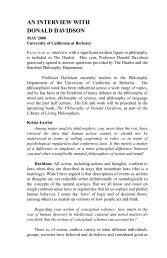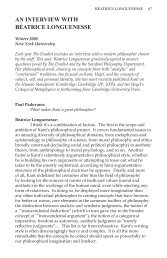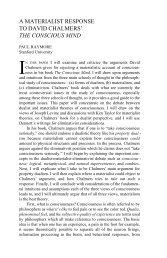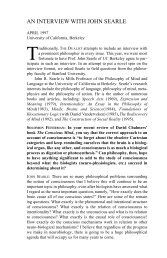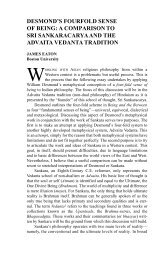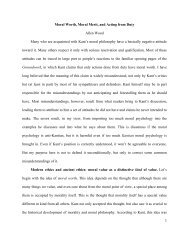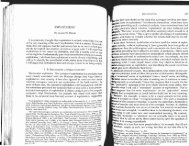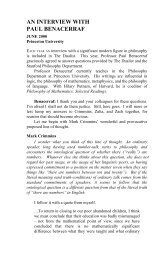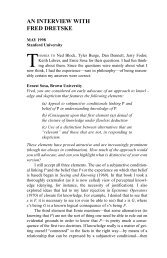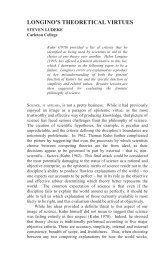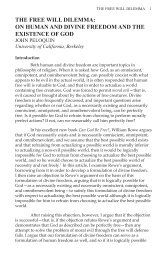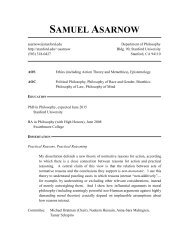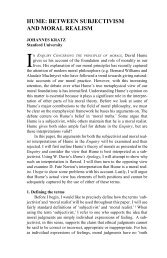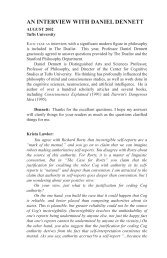The Independence of Right from Ethics Allen Wood Right and ethics ...
The Independence of Right from Ethics Allen Wood Right and ethics ...
The Independence of Right from Ethics Allen Wood Right and ethics ...
Create successful ePaper yourself
Turn your PDF publications into a flip-book with our unique Google optimized e-Paper software.
serve their ends – is an unconditional requirement <strong>of</strong> reason. It is independent <strong>of</strong> <strong>ethics</strong>, <strong>and</strong>independent <strong>of</strong> all ethical values, including the happiness <strong>of</strong> others, or even <strong>of</strong> one’s ownhappiness. <strong>The</strong> exercise <strong>of</strong> coercion by the state, therefore, can never be justified in the name <strong>of</strong>anyone’s welfare or happiness, not even the welfare or happiness <strong>of</strong> all – as utilitarian politicaltheories, for example, seem committed to attempt. Coercion can never be justified except in thename <strong>of</strong> external freedom according to universal law, including the freedom <strong>of</strong> those coerced.This basic idea <strong>of</strong> Kant’s theory <strong>of</strong> right, when stated directly <strong>and</strong> forcefully, has atendency to sound like a libertarian slogan. No doubt this is why Kant’s theory <strong>of</strong> right was atone time read by people like F. A. Hayek, Robert Nozick <strong>and</strong> Mary Gregor as supporting theirlibertarian political ideology. (A recent commentary on the Doctrine <strong>of</strong> <strong>Right</strong> by Sharon Byrd<strong>and</strong> Joachim Hruschka shows that this reading is still alive <strong>and</strong> well.) But earlier twentiethcenturyKantian theories <strong>of</strong> right – those, for instance, <strong>of</strong> Hermann Cohen, Paul Natorp, KarlVorländer, Max Adler, <strong>and</strong> Julius Ebbinghaus -- <strong>and</strong> also the consensus <strong>of</strong> more recenttreatments <strong>of</strong> Kantian right -- by Wolfgang Kersting, <strong>Allen</strong> Rosen, Paul Guyer, LeslieMulholl<strong>and</strong>, Alex<strong>and</strong>er Kaufman, Arthur Ripstein <strong>and</strong> myself – have all defended a verydifferent set <strong>of</strong> conclusions, arguing that Kantian right would sooner result in a social democraticstate than in the state friendly to wealth <strong>and</strong> privilege that is celebrated by libertarians.Libertarians <strong>of</strong>ten claim -- thinking that the claim is good Kantianism -- that no one’sfreedom may be restricted by the state for the sake <strong>of</strong> the welfare <strong>of</strong> others, or even the welfare<strong>of</strong> all. And they are right, as far as that one claim goes. But in practice, their ideology advancesonly the interests <strong>of</strong> concentrated wealth, capital <strong>and</strong> corporate power. That is because their way<strong>of</strong> thinking refuses to acknowledge that it is equally essential to right that the external freedom <strong>of</strong>the rich <strong>and</strong> powerful must be restricted by the state in order to protect the external freedom <strong>of</strong>18



